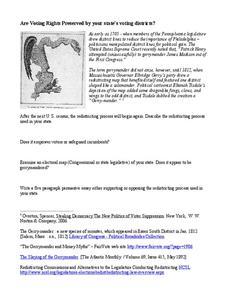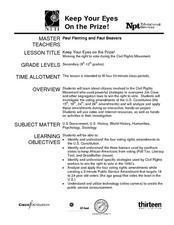Curated OER
The Greek Gods
What were the early Greek myths? Have elementary students examine the Persian Wars and read various Greek myth in order to identify the cause and the results of the Persian Wars. Myths, activities, simulations, and a unit plan are links...
Curated OER
Our Compromise, Our Constitution
Sixth graders explore, analyze and study our constitutional government and become aware of the purpose of our government. They assess the basic rights that are protected by the United States Constitution through graphic organizers and...
Curated OER
The Constitution: The Country's Rules
Pupils become aware of the Constitution and why it is important. In this early government lesson, students compare the Constitution to the class rules. They are both set in place so that we all stay safe and have fun. Pupils draw...
Curated OER
Before Rosa Parks: Early Grades Activity
Students read excerpts from an autobiographical work and retell scenes from the book. They consider the ways Susie King Taylor's autobiography displays character traits including courage, creativity, compassion and determination.
Curated OER
The Articles of Confederation
The purpose of this lesson is to assist students in discovering the weaknesses of the Articles of Confederation and the foundation for creation of the United States Constitution. Students will investigate the events leading up to the...
Curated OER
A Songwriter Not Silenced - Lesson 2
Students discuss how a musician's message can influence society and government. They debate if political viewpoints should be publicized in music.
Curated OER
Supreme Court
Eleventh graders explore the redistricting process. In this American Government activity, 11th graders examine the electoral map. Students write an essay posing an argument for the redistricting process.
Curated OER
The Adventures of Huckleberry Finn
Pupils discuss contemporary situations in which governments mistreat people. They examine real-life instances in which people break the law for what they believe is a higher good. They role play a variety of human rights injustices.
Curated OER
Keep Your Eye On the Prize
High schoolers learn about citizens who were actively involved in the civil rights movement, and the strategies they used to overcome the Jim Crow laws that were so prevalent in the 1960s. They investigate the voting amendments of the US...
National Endowment for the Humanities
The House Un-American Activities Committee
Was the House Un-American Activities Committee justified in investigating subversive influences in the entertainment industry? Part two of the three-part series of lessons that examine the anti-communism movement after World War II,...
Curated OER
A Lesson To Accompany "The First Bank of the United States: A Chapter in the History of Central Banking"
Here is an interesting topic. Learners examine the economics that led to the founding of the First Bank of America. They participate in a reader's theater experience depicting the debate between Alexander Hamilton and Thomas Jefferson...
Curated OER
Jacksonian America and the Indian Removal Act of 1830
Students utilize primary sources to explore the national climate concerning Native American Indians during the Andrew Jackson administration. They are presented with opinions for and against the Indian Removial Act of 1830 as they...
National Endowment for the Humanities
Soviet Espionage in America
The war against Communism and Joseph McCarthy’s place in it are the focus of a series of three lessons examining postwar America from 1945-1950. This first lesson asks groups to read an introduction that describes the Verona Project and...
Curated OER
Witch Hunt or Red Menace? Anticommunism in Postwar America, 1945-1954
Students investigate the goals and methods of the House Un-American Activities Committee and offer an opinion regarding whether their investigation of Hollywood was justifiable.
Tennessee State Museum
An Emancipation Proclamation Map Lesson
Did the Emancipation Proclamation free all slaves during the Civil War? Why was it written, and what were its immediate and long-term effects? After reading primary source materials, constructing political maps representing information...
Curated OER
20th Century American Art
See the changes, controversy, and innovations that define postwar American art. The onset of the modern art era in American history is well-defined in this slide-show. You'll see how Abstract Expressionism shifted into conceptual, pop,...
Curated OER
The Vietnam War 1954-1975
Discuss the full travesty of the Vietnam War. Whether it's for history class, Memorial Day, or Veterans Day, this slide show is sure to make an impact on learners in the upper grades. Vivid images, concise language, and the complete...
Curated OER
The Beginning of the War -- Two Views on Texas
Young scholars discuss the factors that can lead to war, and the motivations of countries going into war. They research two viewpoints on Texas during the Mexican War and participate in a debate with their classmates.
Curated OER
Alaska Purchase
In this reading comprehension and geography worksheet, students read a selection about the Alaska Purchase, its origins as a state, and its attributes. They answer 7 fill in the blank questions using information from the selection.
Curated OER
Jackie Steals Home
Students read articles relating to Jackie Robinson's breaking of the racial barrier in professional baseball. This leads to a deeper exploration of racism in the United States. They use a variety of worksheets imbedded in this plan to...
Student Handouts
Foreign Affairs
Inform your class about foreign policy during the Reagan administration. The resource includes a reading passage that gives an overview of foreign policy decisions made during the Reagan administration and nine questions for pupils to...
Curated OER
Evacuation: The Japanese Americans in World War II
High schoolers examine Japanese internment camps of World War II. In this World War II lesson plan, students use primary and secondary sources to research the evacuation process and life within the internment camps. High schoolers...
Curated OER
Frontier Forts
Seventh graders study frontier forts. In this Kansas history lesson plan, 7th graders research the history and conditions of Fort Leavenworth, Fort Scott, Fort Riley, Fort Larned, and Fort Hays. Students write letters from the...
Constitutional Rights Foundation
The Cold War: How Did It Start? How Did It End?
What is the difference between a Cold War and a Hot War? Scholars research the beginning of the Cold War. They analyze diary entries as well as excerpts from various events during the 45-year standoff. To finish, they prepare final...

























